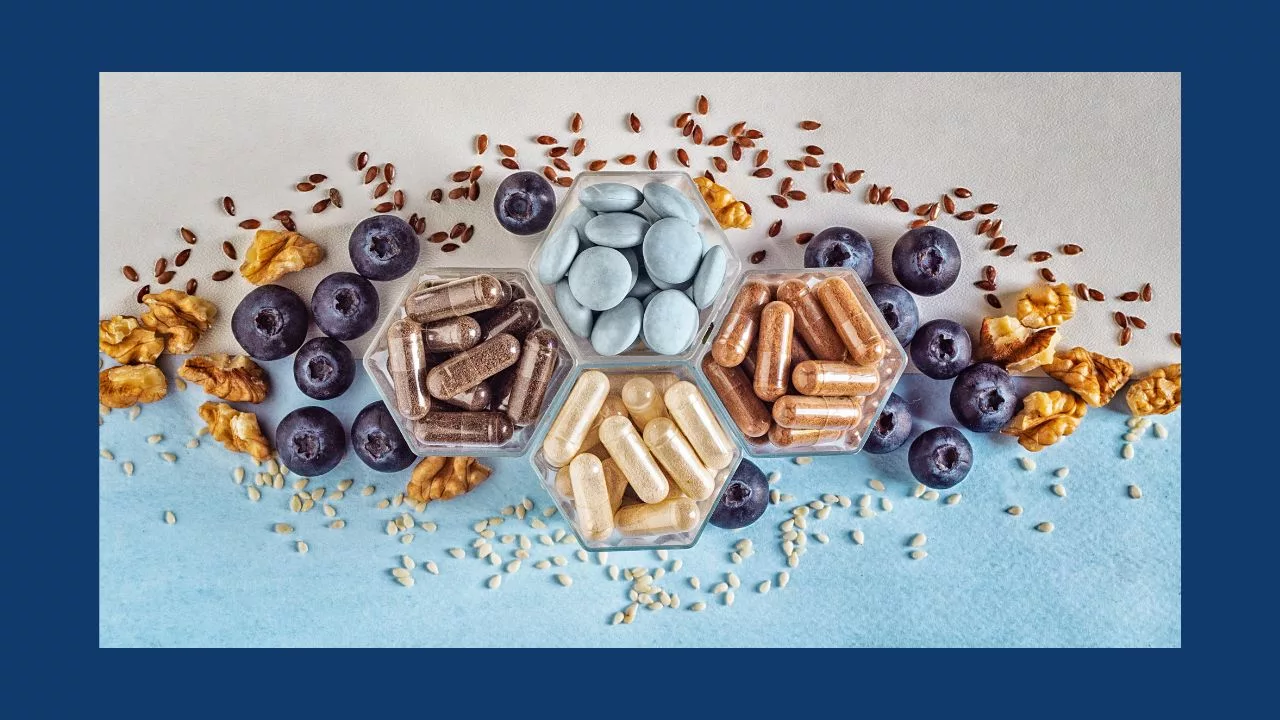
Imagine a team of bodyguards working tirelessly behind the scenes, ready to defend you from daily threats like viruses and infections. This powerhouse? Your immune system. But just like any team, it needs support. Discover the powerful role of supplements in keeping your immune system at peak performance—and learn which ones can also help manage chronic pain.
You might be wondering, ‘How exactly can I make sure my immune system is running at its best?’ Well, there’s a lot of opportunity in the realm of supplements to bolster your immune health. These aren’t magic bullets, but they are tools that can complement a healthy lifestyle to help fortify your body’s natural defenses.
In the next section, ‘Top Vitamins for Immune Health,’ you’re going to find out about some key players in the supplement game. I’m talking about vitamins like C, D, and E, each with its unique benefits for immune support. It’s not enough to just know they’re good for you – I’ll explain the backing science and how these vitamins contribute to your immune system’s well-oiled machine, and how they can also help in managing chronic pain. Disclaimer: Always consult with a healthcare provider before starting new supplements, as they may interact with medications or conditions.
Top Vitamins for Immune Health
Your immune system is like a finely tuned orchestra; every piece needs to be in harmony for the music to resonate. Vitamins play lead roles in this complex symphony, orchestrating a robust immune response. I’m going to hone in on some key players that are pivotal for keeping your immune system in top form.
Vitamin C 
The rockstar of immune health. It’s not just about staving off scurvy; it’s also about how Vitamin C supports cellular functions, according to the NIH, of both the innate and adaptive immune systems. It’s like your body’s first line of defense against the onslaught of pathogens.
Chronic Pain Connection: Vitamin C also plays a role in collagen production, which is essential for maintaining healthy joints and tissues. This can be particularly beneficial for those suffering from chronic pain related to conditions like arthritis or musculoskeletal issues.
Tip: Take Vitamin C with meals for better absorption, ideally from whole-food sources like citrus fruits and berries.
Vitamin D
Think of it as the conductor, guiding the immune system. It manages the production of antimicrobial proteins, dialing up your body’s ability to fight off invaders. Mayo Clinic reports that adequate Vitamin D levels are essential for immune function and may help reduce susceptibility to infections.
Chronic Pain Connection: Adequate levels of Vitamin D are linked to lower pain levels in chronic pain conditions such as fibromyalgia and chronic back pain. Vitamin D helps modulate the inflammatory response, potentially reducing pain.
Tip: Consider a daily Vitamin D supplement, especially in the winter months, or aim for at least 10-30 minutes of midday sunlight.
Vitamin E
An understated yet powerful antioxidant. Research from Harvard Health suggests that Vitamin E is vital for protecting immune cells from oxidative stress (that comes with battling viruses and bacteria), especially in aging populations. So, it’s not just for the young; it’s vital throughout your lifespan.
Chronic Pain Connection: As an antioxidant, Vitamin E helps reduce oxidative stress and inflammation, which are common contributors to chronic pain. This makes it a valuable addition to the diet of anyone managing chronic pain.
Tip: Get Vitamin E from foods like nuts, seeds, and green leafy vegetables, or consider supplements if dietary sources are limited.
B Complex vitamins
The unsung heroes, supporting cellular energy production and contributing to the synthesis and repair of DNA and RNA. In an immune context, they keep the cells functioning at their best, which is essential for a fast and efficient response to pathogens.
Chronic Pain Connection: According to Cleveland Clinic, B vitamins, particularly B6 and B12, are essential for nerve health and cellular energy, impacting immune response. They can help in managing neuropathic pain and maintaining energy levels, which is crucial for those dealing with chronic pain.
Tip: If you’re dealing with low energy or chronic pain, a B-complex supplement can provide a balanced dose. Try taking it with breakfast for energy throughout the day.
Minerals and Herbs: The Immune System’s Ally
So, you’ve got a handle on the vitamins that are crucial to keeping your immune system in tip-top shape. Now, let’s turn our attention to minerals and herbs, and you’re going to find out about some powerful players in the game of immune defense.
Zinc.
This mineral is essential, and your body needs it for countless processes. In the realm of immune function, zinc is a linchpin for the development and communication of immune cells. It’s often in the spotlight when cold season comes around, and for good reason. Zinc lozenges? They’re not just a trend; research from Johns Hopkins Medicine supports zinc’s role in immune function, noting it may help shorten the duration of colds.
Chronic Pain Connection: Zinc plays a role in reducing inflammation, which can help manage pain levels. Adequate zinc intake is crucial for those dealing with chronic pain, as it supports overall immune health and reduces inflammatory responses.
Tip: Zinc is best taken with food, but avoid taking it with calcium or iron supplements as they can interfere with absorption.
Selenium
Another mineral hero, often found hanging out in nuts and seeds. It’s not just good for the heart; selenium walks the talk with its antioxidant prowess, protecting your body’s cells from the damage causing hooligans known as free radicals. Plus, selenium directly contributes to immune function, making it a mineral not to skip.
Chronic Pain Connection: The NIH highlights selenium’s role as an antioxidant that helps reduce oxidative stress and inflammation, which are often linked to chronic pain. Incorporating selenium-rich foods can support both immune health and pain management.
Tip: Selenium is highly concentrated in Brazil nuts; just one or two nuts a day can meet your daily needs naturally.
Elderberry 
This botanical has been used for centuries and it’s still going strong. Elderberry is loaded with vitamins and antioxidants, and it’s not just folk wisdom—it has been shown to lend a hand in shortening flu symptoms. A study in the Journal of Functional Foods found that elderberry may reduce cold symptoms and duration.
Chronic Pain Connection: Elderberry’s anti-inflammatory properties can help in managing chronic pain. Its antioxidants support overall health and reduce inflammation, providing relief from pain symptoms.
Tip: Elderberry supplements come in various forms, such as syrups or capsules. Take at the onset of cold symptoms for the best results.
Echinacea
Another herb that’s grabbed the spotlight, often recommended to ward off or alleviate cold symptoms. Echinacea is known for its immune-boosting properties, helping your body fight off infections more effectively. Cleveland Clinic notes that echinacea may help activate the immune system, reducing the duration of colds.
Chronic Pain Connection: Echinacea may help reduce inflammation and support immune health, which is beneficial for managing chronic pain. By boosting the immune system, it can also help the body better cope with pain-related conditions.
Tip: For best results, start taking echinacea at the first sign of a cold and continue for up to a week.
Turmeric 
This isn’t just some trendy latte ingredient; it’s a potent anti-inflammatory. Curcumin, the main active compound in turmeric, has a reputation for battling inflammation, which is critical because chronic inflammation can be an immune system setback.
Chronic Pain Connection: The Mayo Clinic endorses turmeric for its anti-inflammatory benefits, particularly for joint health and pain management. Curcumin helps reduce inflammation and pain, especially in conditions like arthritis and other inflammatory diseases.
Tip: Curcumin is best absorbed with black pepper and healthy fats, so pair your turmeric with meals containing these ingredients.
I’m not just giving you a list of supplements; I’m guiding you towards understanding how these elements work together with your body’s natural defenses. So remember, choose something that resonates with you and your unique health needs.
Lifestyle Factors and How Supplements Enhance Immune Health
Now, you’ve learned about the powerhouses in the supplement world that can help fortify your immune system. But guess what? They aren’t the lone heroes. It’s crucial to remember that supplements are just one part of a larger health mosaic. Your lifestyle choices play a huge role in how your immune system performs.
A balanced diet, regular exercise, adequate sleep, and stress management are the foundational pillars for robust immune function. Supplements can help fill gaps in your diet or give you an extra edge, but they’re not a cure-all. Think of them as your support team, boosting the efforts you’re already making.
Chronic Pain Connection: For individuals managing chronic pain, these lifestyle factors are even more critical. Regular physical activity, tailored to avoid overexertion, can help reduce pain and improve overall function. Adequate sleep is essential, as poor sleep can exacerbate pain symptoms. Stress management techniques, such as mindfulness and relaxation exercises, can also reduce pain intensity and improve quality of life.

When considering adding supplements to your regimen, a one-size-fits-all approach doesn’t work. Your needs can vary based on your age, diet, health status, and level of physical activity. That’s why it’s a good idea to consult with a healthcare provider before you start popping pills.
In conclusion, choose supplements that resonate with you and your specific needs. Remember to prioritize a healthy lifestyle, and see supplements as part of a comprehensive strategy for keeping your immune system in top shape. Your first attempt at an immune-boosting routine doesn’t have to be your last—adjust it as you go, and don’t worry too much about perfection. After all, it’s about taking steps towards a healthier you, not just for today, but for all your tomorrows.

